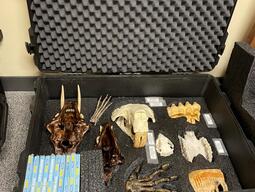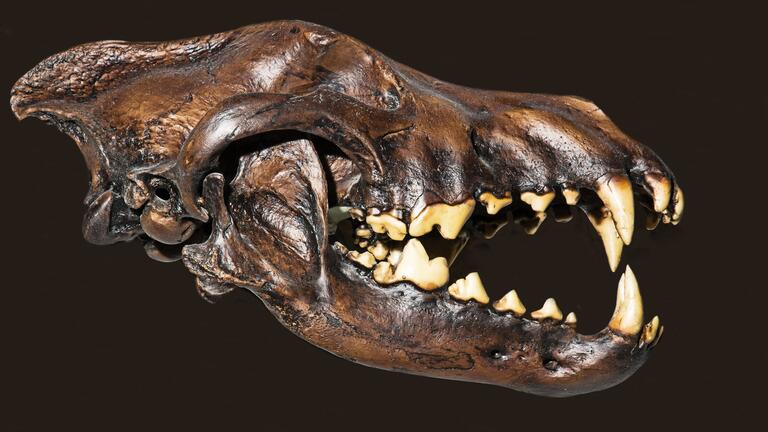Series 1: The Pleistocene Extinction
Once upon a time, giants walked the Earth. From beavers the size of bears to sloths the size of giraffes, to mammoths and mastodons and saber-toothed cats, Canada was home to creatures far larger — and stranger — than any living here today. To the people who lived alongside them, the Pleistocene megafauna represented danger and survival all in one hairy package. But then something happened: the Ice Age ended, and 38 different types of mega-mammals went extinct. What happened is clear—why has been hotly debated by scientists and the media alike!
Through the Pleistocene Teaching Kits, your students will discover fascinating extinct creatures, explore the latest thinking on why they disappeared, and apply these lessons to urgent conservation issues facing the natural world today. The Kits are available free to teachers across Canada and include:
- Fossil casts of mammals that lived in Canada during the Pleistocene
- Supporting materials such as magnifying glasses, graphs, and charts
- Teacher’s Guide containing
- ALL the information needed to teach core concepts
- Suggestions for hands-on learning and independent inquiry
- Glossary, further reading lists, and bibliography of sources
- Content vetted by experts in palaeontology, education, science communication, and Indigenous issues
Junior Edition
Best for Grades 4-7
- Habitat
- Evolution and adaptations
- Biodiversity and classification systems
- Food chains and energy pyramids
- Competition and predator/prey interactions
- Climate change
- Extinction
Senior Edition
Best for Grades 8-12
- Habitat and geographic range
- Evolution and adaptations
- Competition and predator/prey interactions
- Trophic cascades
- Heredity and ancient DNA
- Climate change
- Extinction
- De-extinction: biotechnology & bioethics
- Correlation vs. causation
Series 2: Vertebrate Evolution
Evolution is out of this world. Literally! During their history, vertebrates (animals with backbones) evolved new types of limbs that let them leave familiar habitats to colonize new ones:
- Fish fins became feet, and the first amphibians walked on land
- Feet grew feathers, and dinosaurs took to the skies
- Mammals made flippers, returning to the seas once more
Now, human beings are using r-evolution-ary technology to make one final leap—from the safety of Earth into the vast reaches of outer space.
The Evolution Teaching Kits take a voyage of discovery through these key turning points in the history of life on Earth. Your students will study fascinating fossils, be transported to extinct ecosystems, and use their own bodies to model the movements of creatures from black lagoons… all while deepening their understanding of the processes that connect and transform all life on Earth. Palaeontology Teaching Kits are available free to teachers across Canada!
Junior Edition
Best for Grades 4-7
Feet, Flight, and Flippers:
an Introduction to Vertebrate Evolution
Senior Edition
Best for Grades 8-12
Vertebrate Evolution:
New Bodies That Colonized New Habitats
Borrowing Instructions
How to find the physical kits:
The kits are on Floor 1 of the Queen’s Education Library in the Teacher Resource Collection.
Borrow the kit:
Use your Queen’s Library Teacher Card to borrow the kit.
Need a teacher card?
Contact the Education Library staff to request a teacher card:
email: education.library@queensu.ca
phone: 613-533-2191
Note that you will need to show your OCT card when you pick up your Queen’s Library Teacher Card.
Loan period:
2 weeks with unlimited renewals (unless someone else requests the kit)
Classroom visits to Miller Museum of Geology for hands-on pleistocene workshop
Contact:
Linda Tsuji, Museum Curator
email: linda.tsuji@queensu.ca
phone: 613-533-6767
Sample of physical kits




For more information:
Contact Dr. Lynda Colgan at
Lynda.Colgan@queensu.ca









